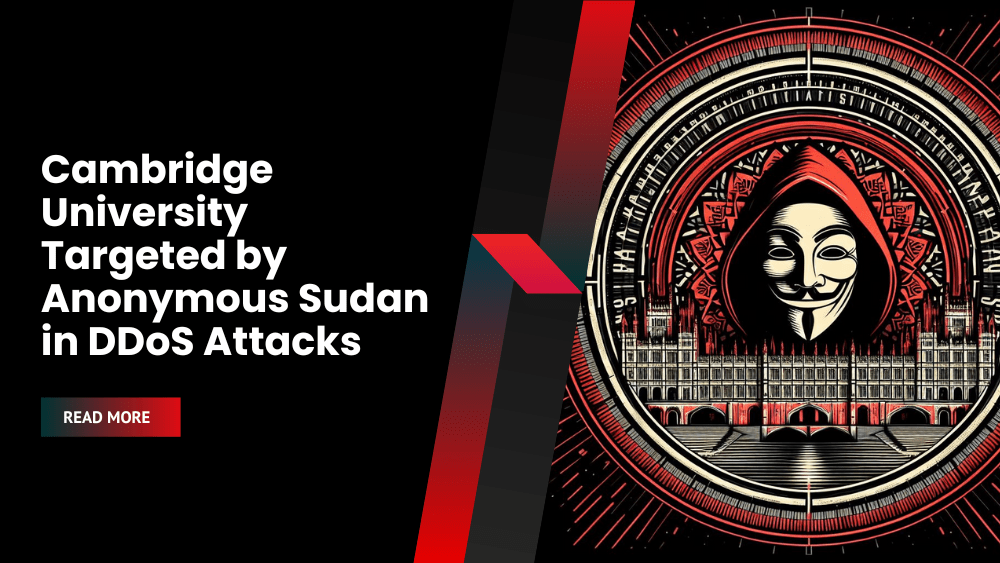The group known as Anonymous Sudan has been involved in a series of DDoS attacks targeting well-known UK universities, specifically the University of Cambridge and the University of Manchester. The Manchester and Cambridge University cyberattacks are believed to be carried out using the Skynet botnet.
Anonymous Sudan recently enhanced its capabilities, as stated in a post attributed to the group. Their reasons for carrying out these attacks include the perceived support of the UK for Israel and its involvement in conflicts such as Gaza and the bombing campaigns in Yemen.
Anonymous Sudan Targets Cambridge in DDoS Attacks, UK University Cyberattack Claims
In a Tweet the University of Cambridge said,
“The intermittent network access issues experienced by some users at the University of Cambridge in the last 24 hours have been resolved and normal service should now be restored for centrally managed IT services.”
As of now, the University of Manchester has not provided any official statement or updates regarding the alleged cyber attack. Therefore, the university’s response to these claims remains unknown.
On the other hand, the threat actor behind the University Cyberattacks has confidently proclaimed their involvement, stating,
“We have successfully carried out a significant cyber attack on the digital infrastructure of two prominent UK universities, specifically the University of Cambridge and the University of Manchester.”

The motive behind the attack on the UK universities is attributed to the country’s perceived unwavering support for Israel and alleged involvement in the ongoing conflicts in Gaza and Yemen.
The threat actor claims that any harm inflicted upon the targeted universities in the Manchester and Cambridge Cyberattacks and any resulting collateral damage is a direct consequence of these reasons.
The abundance of sensitive personal, financial, and confidential information, as well as valuable research data, makes higher education institutions attractive targets for malicious actors.
Who is Anonymous Sudan?
The hacker group known as Anonymous Sudan has been actively involved in carrying out numerous DDoS attacks worldwide since early 2023. Despite claiming Sudanese roots and targeting activities deemed “anti-Muslim,” their actual origins remain unclear, with possible connections to Russia.
While they have gained attention through public warnings and propaganda, Anonymous Sudan is just one among many groups leveraging DDoS attacks. Their motives, which go beyond ideological pursuits, have been obscured by their collaboration with groups like Killnet.
The suspicion of ties to Russia arises from linguistic cues and similarities in infrastructure. Anonymous Sudan primarily relies on DDoS attack tactics, flooding their targets with malicious traffic, often preceded by public threats.
Their methods include the use of HTTP floods and rented server clusters, indicating significant financial support. Their modus operandi is designed to attract attention and create uncertainty, but their true intentions and origins remain elusive.
Mitigation Strategies and Protection Against University Cyberattacks
Safeguarding educational institutions from cyber threats presents distinctive difficulties due to the requirement for open network access for both staff and students. Effectively mitigating these threats involves comprehending different attack vectors and implementing appropriate solutions.
According to Lamar University, some of the threats that universities and educational institutions face include phishing and spear phishing attacks, exploiting vulnerabilities in outdated operating systems and software, and unauthorized access to hardware.
To address these challenges, it is crucial to educate individuals about cybersecurity practices. Additionally, implementing strong password policies, employing multi-layer security measures, encrypting sensitive data, and utilizing multi-factor authentication are vital steps in protecting educational institutions from cyber threats.
In addition, maintaining regular data backups is crucial to minimize the impact of ransomware attacks. Furthermore, limiting access to sensitive data can help reduce the risks associated with insider threats.
Regarding the cyberattack on the University of Manchester, the situation is still unfolding, and we will provide updates on the incident once we obtain more information or receive official confirmation from the educational institutions involved.









